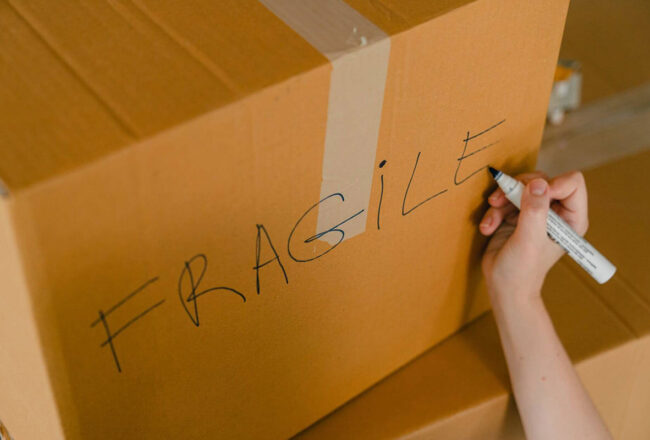Is moving traumatic? This is a question that probably bothers us the moment we decide to relocate and start our life anew. Unfamiliar surroundings, new job, lack of familiar faces – it all adds up to stress, anxiety, and, in more extreme cases – trauma.
Relocating to another state or city can indeed be a significant stressor in one’s life. Whether it constitutes trauma can depend heavily on the individual’s personal experiences and the specific circumstances surrounding the move. The complex interplay of physical, emotional, and social factors can potentially escalate the distress experienced during this transition.
Is Moving Traumatic?
Shifting to a new place can be a big source of stress and anxiety for many people. The level of trauma it can cause varies greatly, depending on a person’s unique experiences and the details of the relocation itself. Various physical, emotional, and social elements can combine to increase the strain during this time. Different individuals might experience a diverse range of feelings, including excitement, sadness, and sometimes even a profound sense of loss.
This sense of dread, sometimes termed “transfer trauma” or Relocation Stress Syndrome, encapsulates the range of symptoms experienced when one transitions from a familiar environment to an unfamiliar one. This is documented in research published on the South Dakota State University website.
Why Moving Can Be Traumatic
Relocating to a new state can sometimes unleash a whirlpool of emotions, from the excitement of starting fresh to even depression. It’s not merely a change of surroundings but often involves deeper transitions. It might involve moving elderly parents out of state or grappling with the realities of bringing a long-distance relationship to a closer proximity.
Emotional Attachment to Places and Memories
The act of leaving a beloved place can bring about a complex blend of feelings. Sometimes, it’s the melancholy of saying bye to friends or the nostalgia attached to a childhood home. These emotional attachments might even influence decisions on relocating, including choosing between the best cities in America to raise a family or considering the cost of interstate moving as a factor. It’s a chapter ending, making room for the beginning of a new story filled with potential cherished memories in perhaps one of the best coastal cities to raise a family.
Stress of Change and the Unknown
When faced with the looming responsibilities of a relocation, it’s natural to feel overwhelmed, even when you know you’ve invested in long-distance moving services. From figuring out how to pack efficiently to learning how to pack a relocation truck correctly to prevent damage, the list seems endless.
Add to that the pressure of possibly having to organize a successful garage sale or contemplating how to tip movers appropriately, it can all quickly escalate to a stressful situation. Amidst the chaos, it might even come down to last-minute arrangements, which adds another layer of uncertainty.

How Children Might Perceive and React to the Change
Those with kids might be wondering – is moving traumatic for kids? Children may feel a mix of excitement and nervousness when faced with the prospect of relocating. This transition can seem even more significant in their eyes, as they try to navigate changes in their daily routines and social circles.
The Challenge of Adjusting to New Schools, Friends, and Routines
For youngsters, settling into new schools and forming friendships can be quite an adventure. The shift in routines and the effort to find their place in a new environment and make new friends can sometimes be overwhelming. Hence, it’s essential to foster a supportive atmosphere where they can freely communicate their fears and feelings, helping them adapt more smoothly to the changes at hand. This open dialogue can be a crucial step in ensuring a positive transition, encouraging them to embrace the new opportunities that await.

What Effects Does the Move Have on Adults
But is moving traumatic for adults? The relocation process can bring about substantial changes in an adult’s life as well. Challenges with job relocation or starting anew in unfamiliar territories can be daunting. The feeling of nostalgia and the grief associated with leaving known surroundings can sometimes be overshadowed by the logistical demands of the move. Here are some of the challenges that adults face that cause them trauma:
- We may face professional upheavals, having to adapt to new job roles or hunt for job opportunities in a new city.
- There might be a grieving period where adults miss their old neighborhoods, friends, and the comfort of familiar surroundings.
Challenges with job relocation or starting anew in unfamiliar territories and nostalgia and the grief of leaving behind known surroundings are the usual causes of stress and trauma with adults.
What Are the Physical Stresses of Moving State to State
The process of shifting to a new residence often brings with it a series of physical stresses that can take a toll on individuals. The demands of packing, the heavy lifting, and the constant hustle and bustle can lead to physical exhaustion, sometimes even resulting in injuries or strains. Furthermore, amidst the chaos, individuals often neglect essential aspects like adequate nutrition and rest, which can exacerbate the physical toll.
The Demands of Packing and Unpacking
The process of organizing packing and unpacking can be physically demanding. It is not just labor-intensive but also carries a potential risk for injuries. Ensuring that enough time is allocated for these tasks and seeking help when necessary can mitigate some of these stresses.
Lack of Sleep and Exhaustion
A significant relocation, such as from a house to an apartment, often comes with a disruption in sleep patterns and adjustment insomnia. Insufficiency of rest during this transition phase can escalate physical and emotional exhaustion, emphasizing the necessity to prioritize rest wherever possible.
Nutritional Neglect
During the relocation process, there might be a tendency to opt for convenience foods, potentially leading to health challenges. It’s crucial to make an effort to maintain a balanced diet, possibly by preparing easy-to-cook meals, to sustain energy levels and overall health.

What is the Emotional and Social Impacts
Relocating to a new area isn’t just a physical shift, but it involves an intricate mesh of emotional and social adjustments as well. Understanding and acknowledging these aspects can be a pivotal step in smoothing the transition, allowing for a more harmonious integration into the new community and surroundings.
Loss of Social Connections
Relocating can sometimes mean leaving behind a closely-knit community or social circle. The challenge here is in building new connections and friendships while preserving old relationships, a delicate balance to maintain in the initial stages after relocating to a new area.
Adapting to New Norms
When the relocation is across vastly different regions or international borders, individuals face the added pressure of adapting to new cultural norms and societal expectations. This adaptation can be an enriching experience but may also bring feelings of isolation initially.
Potential Feelings of Isolation
Entering a new community can sometimes bring about feelings of isolation. It might take time to forge new friendships and connections, making it essential to find avenues to integrate into the community, like joining clubs or online groups.
How to Lower the Trauma of Moving
The intensity of various stressors can be substantially reduced by employing a few strategic measures. Being well-prepared, seeking emotional and psychological support, indulging in self-care, and establishing early routines in your new home can act as buffers against the potential trauma. Remember, the key to a smoother transition lies in a balanced approach.
Preparation is Key
Ensuring a smoother transition involves meticulous preparation. Planning ahead and acquainting oneself with what to expect can significantly lessen stress levels. Researching the new area and setting realistic expectations can be extremely beneficial. Also, investing in solutions like auto transport services can take away some of the pressure.
Having a Support System and Engaging in Self-care
In the midst of the transition, one of the pillars that can immensely alleviate the pressures is having a robust support system. It’s incredibly beneficial to lean on the existing networks of friends, and family, or even seek professional assistance. These support structures can act as a steady pillar of strength and guidance, aiding individuals to navigate the fluctuating emotions often synonymous with relocating.
Simultaneously, self-care should take a front seat during this period. It’s not merely about the physical aspects of relocating but ensuring that your mental and emotional well-being are tended to. Paying attention to one’s well-being is essential during this period. This might involve:
- Setting aside time for relaxation and recreation,
- Maintaining a balanced diet,
- Ensuring sufficient sleep.
These seemingly small yet significant steps can be your cornerstone, facilitating a smoother and healthier transition into your new chapter of life.
Establishing Early Routines
In the midst of a relocation, establishing early routines can be a beacon of stability and comfort. To cultivate a sense of normalcy and continuity, it’s not only wise but comforting to set up regular routines swiftly in your new environment. This could encompass organizing regular meal times to provide structured, comforting moments in the day, or actively continuing with a hobby that brings joy and relaxation. Moreover, setting up your living space in a manner that resonates with your taste and preferences can be immensely grounding.
The following video talks about how light exposure affects your sleep schedule.
Navigating the Transition with Resilience
The experience of moving interstate can encompass a myriad of challenges and stresses, both physical and emotional. By acknowledging the potential hardships and taking proactive steps to mitigate them, individuals can navigate this significant life change with resilience and optimism. Establishing early routines and engaging in self-care can be instrumental in adapting to the new environment and turning a fresh page in the journey of life.
As you embark on this significant life transition, remember that professional help is at your fingertips. Reach out to State2State Movers, where a team of experts is ready to make your relocation seamless and stress-free with our expert packing services and other solutions. Whether it’s offering guidance on packing efficiently or facilitating a smooth move, trust our state-to-state movers to be your reliable partner in this journey.
FAQ
Why Is Moving Often Considered One of the Most Stressful Life Events?
Moving is considered stressful due to the multitude of changes it entails – leaving a familiar environment, adjusting to a new place, and handling numerous logistical challenges.
How Does Moving Affect Children Differently Than Adults?
Children might face more difficulty in adapting to new surroundings as they leave behind known schools and friends, whereas adults grapple with the logistical and financial aspects of the move.
Are There Any Long-Term Emotional Impacts of Frequent Relocations?
Yes, frequent relocations can sometimes lead to long-term emotional impacts like increased anxiety and difficulty in forming stable relationships.
What Are the Common Emotional Responses to Moving?
Common emotional responses include anxiety, sadness, excitement, and at times, feelings of loss or mourning.
How Can the Stress of Moving Manifest Physically?
Physical manifestations of relocation stress can include fatigue, sleep disturbances, muscle aches, and sometimes even digestive issues.
Why Do Some People Feel Grief or Mourning When Leaving Their Old Home?
The feeling of grief or mourning stems from the loss of familiarity and the emotional connections built between the old home and the community.
How Does an International Move, With Cultural Shifts, Add to the Emotional Strain?
International moves intensify emotional strain as individuals have to adapt to new cultural norms, language barriers, and, often, a change in lifestyle.
Are There Particular Age Groups or Demographics More Vulnerable to Moving-Related Stress?
Elderly individuals and children can be more vulnerable to relocation-related stress due to health concerns and adaptability issues, respectively.
What Role Does Saying Proper Goodbyes Play in Easing the Transition?
Saying proper goodbyes helps in achieving closure and easing the emotional transition by honoring the memories and connections made.
How Can One Build Resilience to the Challenges of Moving?
Building resilience involves adopting a positive outlook, being adaptable, and developing coping strategies to handle the challenges of relocating.
How Does the Uncertainty of a New Place Contribute to Feelings of Anxiety?
The uncertainty of a new place can fuel feelings of anxiety due to the apprehension of the unknown and the pressure to adapt quickly.
Can the Act of Physically Packing and Sorting Belongings Cause Emotional Distress?
Yes, physically packing and sorting belongings can cause emotional distress, as it might involve parting with items that have sentimental value.
What Are Some Signs That Someone Might Need Professional Support During a Move?
Signs that someone might need professional support include extreme anxiety, depression, or an inability to cope with the changes brought about by the move.
Why Do Some People Feel Isolated Even After Settling Into Their New Home?
Some people feel isolated even after settling in due to difficulty in forming new social connections or a lingering attachment to their previous community.
How Do Unexpected Complications During the Move Process (Like Lost Belongings) Influence Overall Stress Levels?
Unexpected complications, like lost belongings, can escalate overall stress levels as they add to the list of things to manage and resolve during the relocation.















